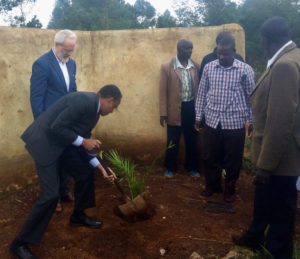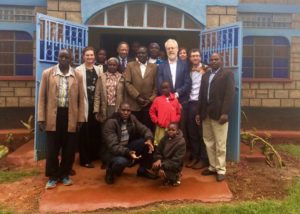Several visitors, including Duke Global Health Institute director Chris Plowe and Chancellor of Duke Medicine Eugene Washington, recently visited the Puffer lab’s research site in Eldoret, Kenya. The team visited our local community partners, including churches, who partner with us to deliver family therapy in communities. They met some of our trained lay counselors and heard about the challenges and rewards of providing family therapy in this setting where mental healthcare is very scarce. The team also participated in a tree planting ceremony to commemorate their visit to a rural church. Within the Tuko Pamoja program, the tree is a central metaphor used to symbolize the family, making this a poignant symbolic gesture.
Puffer lab graduate students and postdocs also presented their specific current projects to the visitors, including research on how counselors integrate their local knowledge and practices when they deliver the therapy; how we can use technology to more efficiently supervise lay counselors; how understanding experiences of role transition and burnout among lay counselors can improve support networks; and the psychosocial burden among caregivers of children with sickle cell disease. Chancellor Eugene Washington was particularly interested in the concepts of lay counselors and technology-supported supervision as practices that are also desperately needed in rural North Carolina. He hopes that Duke can learn from the Puffer lab and improve delivery of care at home.

Duke Medicine Chancellor Eugene Washington participates in a tree-planting ceremony to commemorate the visit

